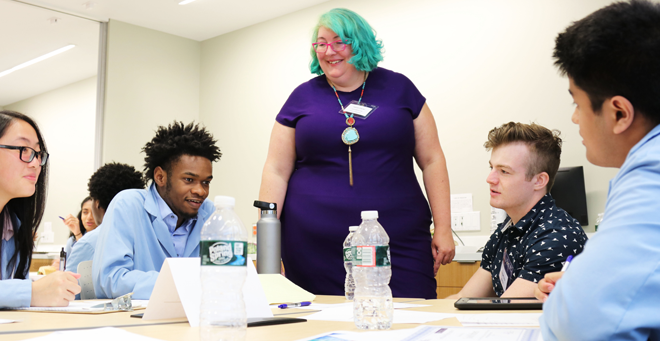
|
A new approach to improving public health, the “Woo Health Hack” was held at UMass Medical School on Monday, July 22, as teams of high school, college and medical students devised creative ways to use medical simulation technology to meet the goals outlined in the regional Community Health Improvement Plan. Held at the Innovations Lab of the interprofessional Center for Experiential Learning and Simulation (iCELS) at UMass Medical School under the aegis of the Office of Community and Government Relations, the “hackathon” was a pilot for a citywide public health brainstorming initiative taking place Nov. 15 and 16.
The event was modeled on a traditional computer programming hackathon—a competitive event in which people work in groups on projects, with the goal of creating a functioning product by the end of the event.
“Our goal is to better employ iCELS resources for a wider audience, in order to make a greater impact on the people of Worcester, and what better way to do that than leveraging great young minds to help us,” said Yasmin Carter, PhD, assistant professor of radiology in the Division of Translational Anatomy and founding director of the Innovations Lab. “One of the first things we’re looking at is how simulation could be used in public health. We’re looking for creative solutions that people who work in the field all day, every day don’t necessarily think of, and hope that it will help the participants see that their voices matter and not all health solutions come from health professionals.”
The lively, four-hour hackathon began with a tour of iCELS to introduce participants to the technologies available and a presentation by Dr. Carter about the larger citywide public health project. Next, teams comprising members of the High School Health Careers Program’s Class of 2019, UMass undergraduates in the BaccMD Pathway and medical student volunteers brainstormed how the resources could be deployed to address public health issues. These included substance use among teens, teen pregnancy, healthy diets for people with diabetes, obesity awareness, promoting healthy lifestyle habits, language barriers and job training.
For its winning Woo Sugar project to improve health literacy in food selection for patients with type 2 diabetes, the A3D2 team proposed creating a free app that scans the barcodes of food products as users shop for groceries, translates the nutritional values into laymen’s terms and provides a pictogram addressing the specific food’s suitability relative to diabetes. A simulation component would show how different foods affect blood sugar levels, and a virtual reality component would engage local grocery stores in the initiative.
“The project is unique because it incorporates virtual reality to give people who are at risk for type 2 diabetes accurate information,” team members wrote. “It is innovative because it uses an interactive training technique to promote behavior modification.”
“Bringing together a lot of people with different backgrounds and different areas of expertise, including members of the broader community is compelling, especially in health care,” said fourth-year School of Medicine student Abraham Lin. “It has been eye-opening to see how much these young students know, how compelling and feasible their ideas are and how creative they are in applying their own experiences and knowledge to bigger problems like how to improve health literacy. There’s a lot of potential to use relatively low-cost simulation and other technology tools to educate the general population.”
The iCELS Innovations Lab is a space dedicated to creative thinking in medical education and research. State-of-the-art equipment and devices available include 360 headsets and recording equipment for augmented and virtual reality simulations; 3D printers; and the Anatomage Table for virtual dissection.
The Office of Outreach Programs, Office of Community and Government Relations and iCELS will host the citywide hackathon on Friday, Nov. 15, and Saturday, Nov. 16, at UMMS.
“Consistent with our public service mission, UMMS is proud to lead this effort to bring together students from various disciplines and schools to devise innovative solutions to the city’s most pressing public health needs,” said Kola Akindele, JD, assistant vice chancellor for city and community relations.